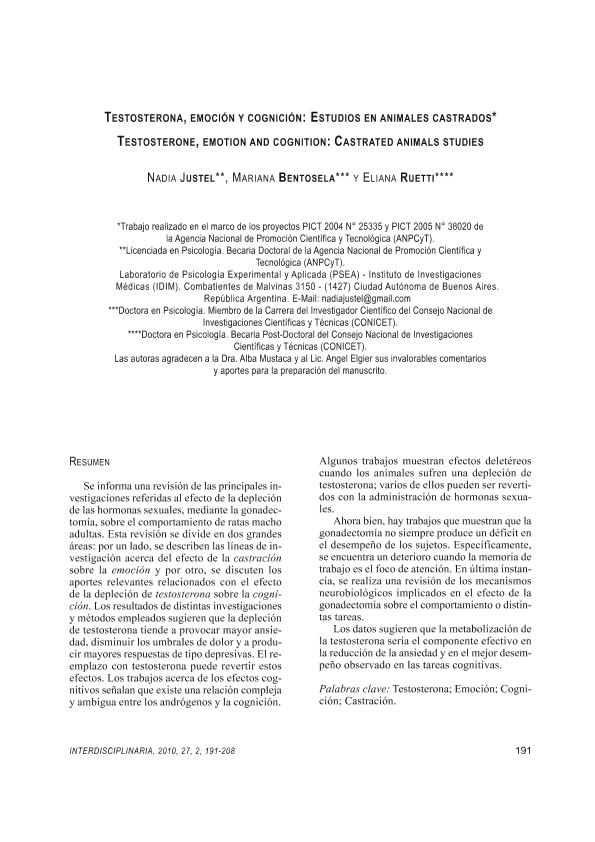Mostrar el registro sencillo del ítem
dc.contributor.author
Justel, Nadia

dc.contributor.author
Bentosela, Mariana

dc.contributor.author
Ruetti, Eliana Martha

dc.date.available
2017-04-18T15:48:50Z
dc.date.issued
2010-12
dc.identifier.citation
Justel, Nadia; Bentosela, Mariana; Ruetti, Eliana Martha; Testosterona, emoción y cognición: estudios en animales castrados; Consejo Nacional de Investigaciones Científicas y Técnicas. Centro Interamericano de Investigaciones Psicológicas y Ciencias Afines; Consejo Nacional de Investigaciones Científicas y Técnicas. Centro Interdisciplinario de Investigaciones en Psicología Matemática y Experimental; Interdisciplinaria; 27; 2; 12-2010; 191-208
dc.identifier.issn
0325-8203
dc.identifier.uri
http://hdl.handle.net/11336/15357
dc.description.abstract
Se informa una revisión de las principales investigaciones referidas al efecto de la depleción de las hormonas sexuales, mediante la gonadectomía, sobre el comportamiento de ratas macho adultas. Esta revisión se divide en dos grandes áreas: por un lado, se describen las líneas de investigación acerca del efecto de la castración sobre la emoción y por otro, se discuten los aportes relevantes relacionados con el efecto de la depleción de testosterona sobre la cognición. Los resultados de distintas investigaciones y métodos empleados sugieren que la depleción de testosterona tiende a provocar mayor ansiedad, disminuir los umbrales de dolor y a producir mayores respuestas de tipo depresivas. El reemplazo con testosterona puede revertir estos efectos. Los trabajos acerca de los efectos cognitivos señalan que existe una relación compleja y ambigua entre los andrógenos y la cognición. Algunos trabajos muestran efectos deletéreos cuando los animales sufren una depleción de testosterona; varios de ellos pueden ser revertidos con la administración de hormonas sexuales.
dc.description.abstract
Sexual behavior is a very important part in the life of animals, and sexual hormones, such as estrogen in females and testosterone in males, regulate the behavior of most mammals. Testosterone, the male sexual hormone, plays an important role in the development of the brain organization necessary for sexual behavior. Some evidences show that testosterone affects animal behavior and has an anxiolytic as well as analgesic effects on the behavior of rats, mice, dogs, and humans. For example, men who have higher endogenous levels of testosterone have a lower incidence of depression. Conversely, young hypogonad men, with low endogenous testosterone, are more likely to be diagnosed with anxiety or depressive disorders, and exhibit decreased performance in some cognitive tasks. In animal models of androgen deficiency, androgens can mediate both, affective and cognitive behavior. Removing rats primary source of endogenous androgens through androgen extirpation (i.e., castration or gonadectomy) results in increased anxiety-like behavior, and detriments in cognitive performance. In the present paper, we review the main research on the effect of sexual hormone depletion, through gonadectomy, on the behavior of adult male rats. There are different ways to study the influence of testosterone on emotion and cognition, the study of the sexual behavior, the study of the administration of testosterone and their metabolites and the effect of the depletion of testosterone. This review is arranged in two main sections: on the one hand, we describe studies about castration effects on animal emotion; on the other hand, we discuss most relevant contributions linked to the effect of testosterone depletion on cognition. To finish, there is a section where we explain the neurobiological mechanisms involved in emotion and cognition of animals with hormone depletion. Data suggests that testosterone modulates emotion, in particular anxiety, fear, pain, and depression responses. Results from different investigations using diverse methodologies suggest that testosterone depletion tends to cause higher anxiety and depressive-like responses and to lower pain thresholds; some of the tests used to evaluated emotion are: open field test, elevated plus maze, defensive burying, Vogel's paradigm, tail flick, hot plate, among others. In addition, testosterone replacement can reverse these effects in male rodents in some of these tests. Studies on the cognitive consequences of hormones point towards the existence of a complex and ambiguous relationship between androgens and cognition. Some studies show deleterious effects when animals are subjected to testosterone deletion, most of which can be reverted with sexual hormones administration, for example in the defensive freezing to electric shocks. However, there are several studies showing that gonadectomy does not always cause a performance deficit, and that the deficit may appear depending on certain variables of the studied tasks, in particular the time intervals among stimuli, for example in radial maze. More specifically, performance deteriorates when working memory is evaluated. To finish, we review the neurobiological mechanisms involved in the effect of gonadectomy on behavior. Similar findings occur when either emotion or cognition is assessed, though studies on this last area are scarcer. Data suggest that testosterone metabolism is the effective component in anxiety reduction and increased cognitive performance. In particular, evidence indicates that androgen and estrogen receptors would be involved in this phenomenon, and that these effects could be blocked through the administration of antagonist drugs. Last, it is important to stress that the relationship between testosterone and both emotion and cognition is extremely complex. There is no doubt that the gonads affect animal and human existence and thus more research is needed to continue studying and clarifying these relationships which play an important role in our existence.
dc.format
application/pdf
dc.language.iso
spa
dc.publisher
Consejo Nacional de Investigaciones Científicas y Técnicas. Centro Interamericano de Investigaciones Psicológicas y Ciencias Afines; Consejo Nacional de Investigaciones Científicas y Técnicas. Centro Interdisciplinario de Investigaciones en Psicología Matemática y Experimental
dc.rights
info:eu-repo/semantics/openAccess
dc.rights.uri
https://creativecommons.org/licenses/by-nc/2.5/ar/
dc.subject
Testosterona
dc.subject
Emoción
dc.subject
Cognición
dc.subject
Castración
dc.subject.classification
Otras Psicología

dc.subject.classification
Psicología

dc.subject.classification
CIENCIAS SOCIALES

dc.title
Testosterona, emoción y cognición: estudios en animales castrados
dc.title
Testosterone, emotion and cognition: castrated animals studies
dc.type
info:eu-repo/semantics/article
dc.type
info:ar-repo/semantics/artículo
dc.type
info:eu-repo/semantics/publishedVersion
dc.date.updated
2017-04-07T15:17:34Z
dc.identifier.eissn
1668-7027
dc.journal.volume
27
dc.journal.number
2
dc.journal.pagination
191-208
dc.journal.pais
Argentina

dc.journal.ciudad
Ciudad Autónoma de Buenos Aires
dc.description.fil
Fil: Justel, Nadia. Consejo Nacional de Investigaciones Cientificas y Tecnicas. Oficina de Coordinacion Administrativa Houssay. Instituto de Investigaciones Medicas; Argentina
dc.description.fil
Fil: Bentosela, Mariana. Consejo Nacional de Investigaciones Científicas y Técnicas; Argentina
dc.description.fil
Fil: Ruetti, Eliana Martha. Consejo Nacional de Investigaciones Científicas y Técnicas; Argentina
dc.journal.title
Interdisciplinaria
dc.relation.alternativeid
info:eu-repo/semantics/altIdentifier/url/http://ref.scielo.org/4pc9xt
dc.relation.alternativeid
info:eu-repo/semantics/altIdentifier/url/http://www.redalyc.org/pdf/180/18018446001.pdf
Archivos asociados
